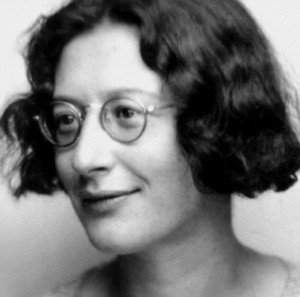„Gott ähneln, aber dem gekreuzigten Gott.“
Schwerkraft und Gnade
Simone Adolphine Weil [ˌsiˈmɔn ˌadɔlˈfin ˈvɛj] war eine französische Philosophin, Dozentin und Lehrerin sowie Sozialrevolutionärin jüdischer Abstammung. Sie war politisch und sozial stark engagiert und hat Aktion und Kontemplation verbunden. Ihr Bruder war der Mathematiker André Weil.
Zunächst war sie eine agnostisch orientierte Gewerkschafterin und gleichwohl Kritikerin des Marxismus. Später entwickelte sie sich zu einer bekannten Mystikerin. Die Einheit von Politik und Religion gab sie niemals auf. Das Leben betrachtete sie als eine Suche nach dem Absoluten. Ihr Denken war von christlicher Mystik sowie von platonischen und buddhistischen Ansichten geprägt, darüber hinaus auch von der jüdischen Tradition, wozu sie sich aber nicht bekannte. Auf sie geht der Gedanke der „décréation“ zurück, der „totalen Selbstentäußerung des Menschen vor Gott“.
Wikipedia

„Gott ähneln, aber dem gekreuzigten Gott.“
Schwerkraft und Gnade
Le prestige, qui constitue la force plus qu'aux trois quarts, est fait avant tout de la superbe indifférence du fort pour les faibles, indifférence si contagieuse qu'elle se communique à ceux qui en sont l'objet.
in The Simone Weil Reader, p. 168
Simone Weil : An Anthology (1986), The Iliad or The Poem of Force (1940-1941)
Quelle: Simone Weil : An Anthology (1986), Human Personality (1943), p. 64
Quelle: Simone Weil : An Anthology (1986), The Needs of the Soul (1949), p. 97
“The state of conformity is an imitation of grace.”
Quelle: Simone Weil : An Anthology (1986), The Great Beast (1947), p. 124
Kontext: The state of conformity is an imitation of grace. By a strange mystery — which is connected with the power of the social element — a profession can confer on quite ordinary men in their exercise of it, virtues which, if they were extended to all circumstances of life, would make of them heroes or saints.
But the power of the social element makes these virtues natural. Accordingly they need a compensation.
Quelle: Simone Weil : An Anthology (1986), The Self (1947), p. 83
Quelle: Simone Weil : An Anthology (1986), The Iliad or The Poem of Force (1940-1941), p. 193
“Morality and literature,” pp. 160-161
On Science, Necessity, and the Love of God (1968)
“The responsibility of writers,” p. 168
On Science, Necessity, and the Love of God (1968)
Waiting on God (1950), Reflections on the Right Use of School Studies with a View to the Love of God
Quelle: Simone Weil : An Anthology (1986), The Great Beast (1947), p. 123; it should be noted that in this comment she is referring to the intolerant traditions of ancient Rome and ancient Isreal, and not the modern entities, one of which did not yet exist at the time of her writing.
Une âme ... n'est pas faite pour habiter une chose ; quand elle y est contrainte, il n’est plus rien en elle qui ne souffre violence.
in The Simone Weil Reader, p. 155
Simone Weil : An Anthology (1986), The Iliad or The Poem of Force (1940-1941)
Quelle: Lectures on Philosophy (1959), p. 76
Quelle: Simone Weil : An Anthology (1986), The Great Beast (1947), p. 122
“Morality and literature,” pp. 164-165
On Science, Necessity, and the Love of God (1968)
Quelle: Simone Weil : An Anthology (1986), Attention and Will (1947), p. 216
“If we want a love which will protect the soul from wounds we must love something other than God.”
Quelle: Simone Weil : An Anthology (1986), Love (1947), p. 62
Quelle: Simone Weil : An Anthology (1986), The Great Beast (1947), p. 123
La force, c'est ce qui fait de quiconque lui est soumis une chose. Quand elle s'exerce jusqu'au bout, elle fait de l'homme une chose au sens le plus littéral, car elle en fait un cadavre.
in The Simone Weil Reader, p. 153
Simone Weil : An Anthology (1986), The Iliad or The Poem of Force (1940-1941)
“Wave Mechanics,” p. 75
On Science, Necessity, and the Love of God (1968)
Letter to her parents (1943), as quoted in the Introduction by Siân Miles
Quelle: Simone Weil : An Anthology (1986), p. 2
Quelle: Simone Weil : An Anthology (1986), Human Personality (1943), p. 63
Il n'est possible d'aimer et d'être juste que si l'on connaît l'empire de la force et si l'on sait ne pas le respecter.
Quelle: Simone Weil : An Anthology (1986), The Iliad or The Poem of Force (1940-1941), p. 192
“Morality and literature,” p. 164
On Science, Necessity, and the Love of God (1968)
Celui qui ignore à quel point la fortune variable et la nécessité tiennent toute âme humaine sous leur dépendance ne peut pas regarder comme des semblables ni aimer comme soi-même ceux que le hasard a séparés de lui par un abîme. La diversité des contraintes qui pèsent sur les hommes fait naître l'illusion qu'il y a parmi eux des espèces distinctes qui ne peuvent communiquer.
Quelle: Simone Weil : An Anthology (1986), The Iliad or The Poem of Force (1940-1941), p. 192
Waiting on God (1950), Reflections on the Right Use of School Studies with a View to the Love of God
“A Pharisee is someone who is virtuous out of obedience to the Great Beast.”
Quelle: Simone Weil : An Anthology (1986), The Great Beast (1947), p. 125
Quelle: Simone Weil : An Anthology (1986), The Great Beast (1947), p. 121; footnote in Gravity and Grace edited by Gustave Thibon: To adore the "Great Beast" is to think and act in conformity with the prejudices and reactions of the multitude to the detriment of all personal search for truth and goodness.